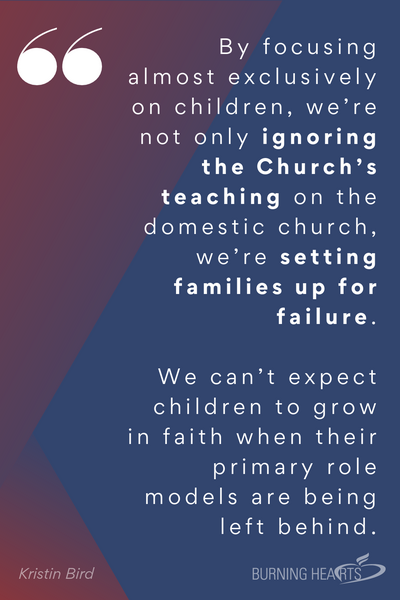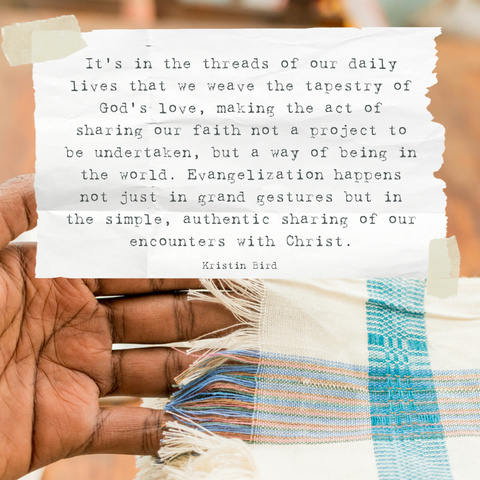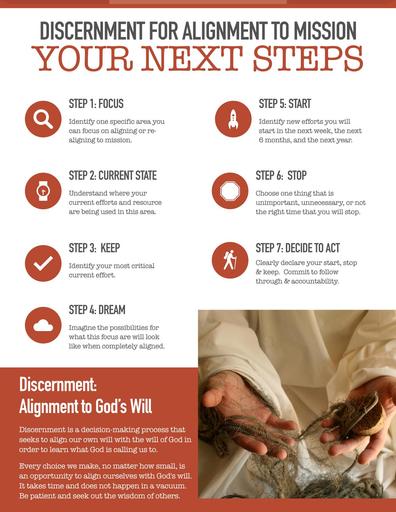The Making Disciples Today Blog has reflections to help you grow in your journey of missionary discipleship, reviews on recommended Catholic evangelization resources, and practical insight on how to evangelize in your daily life.
- Details
- Written by: Kristin Bird

When you walk through the doors of any parish, it’s easy to see where much of our energy goes. From Sunday school classes to youth groups, we pour so much into nurturing the faith of our youngest members. And while that’s important, here’s the reality: if we want our parishes to truly thrive, it’s time to broaden our focus. We need to engage adults in their faith journeys as actively as we do our children.
Why? Because the faith of the next generation depends on it.
The Limits of a Child-Focused Approach
Of course, children are incredibly open to learning about their faith, but here’s the thing: their spiritual growth is largely shaped by the adults in their lives. Parents, especially, have the biggest influence. In fact, research* shows that when parents are living out their faith, their kids are much more likely to do the same. It’s that simple. The family is the domestic church—the place where faith is both taught and caught.
So, what happens if we focus on forming adults just as intentionally as we do our children? The benefits will ripple throughout the entire community.
- Details
- Written by: Kristin Bird

We all have those days that seem to come at us in full force—days where everything feels overwhelming and we wonder if we can make it through. Ministry life can magnify those moments, especially when it feels like we’re supposed to have the answers for everyone. In this thoughtful reflection, Deacon Mike Eash from the Diocese of Green Bay shares his wisdom on handling the "pumpkin spice" days of life—the days that challenge our capacity and test our endurance. His relatable advice is a balm for anyone feeling the weight of ministry and life’s endless demands...
A few weeks ago, my wife Lisa and I travelled to Indiana to visit my family. We were able to visit with my niece which doesn’t happen very often because she is in her early twenties and, well, “has a life.” Like many young people she is trying to find her way through life and is currently a barista at a well-known national coffee chain. When we met up with her, Lisa asked her how work was going. She looked at us with an exasperated look and said, “Pumpkin spice came out today.” No other words were needed to describe how work was that day.
- Details
- Written by: Burning Hearts Disciples Team

In our bustling, complex world, the concept of evangelization often brings to mind images of door-to-door missionaries or street preachers. However, the heart of true evangelization is far richer and more accessible than many of us realize. It's about sharing the Good News of Jesus Christ not through force or fear but through love, mercy, and genuine personal encounters.
In an illuminating tip talk with Catholics on Facebook, Kristin Bird from Burning Hearts Disciples recently delved into the essence of evangelization within the Catholic faith. She challenges the stereotypical images that might deter us from embracing our call to evangelize, offering a fresh, profoundly relational perspective on what it means to share our faith.
- Details
- Written by: Kristin Bird

It was an absolute joy to sit down with Miriam Marston at Mater Dei Radio for her Blazing the Trail podcast series. I had the privilege of sharing our journey and mission with a wider audience, and particularly sharing some of what we're seeing in our accompaniment work with parishes, dioceses, and Catholic schools around the country.

